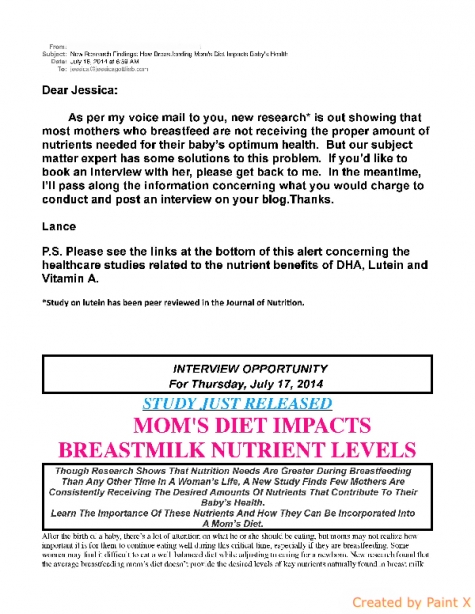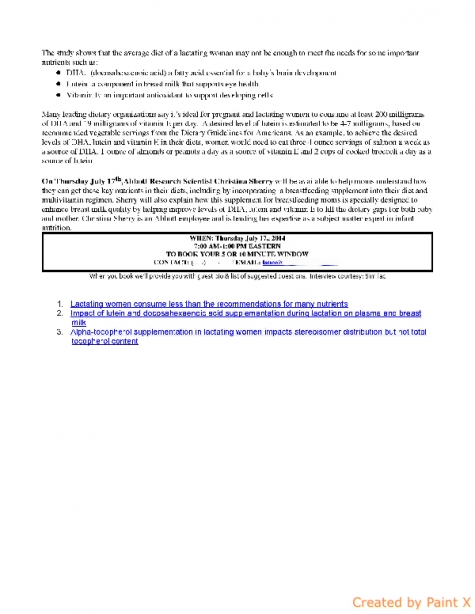How to Read an Email from Similac
Today I sent an email to a man named Lance and started with the following:
I hope you never have children
And then I went on to scold him for his predatory behavior. I didn’t mention the fact he called me a few minutes before 7am or that a woman from his office called me shortly after I posted this.
So I’ll go ahead and disseminate his email for you. It should be entertaining. Before I do this however I’d like new moms to know something.
Abbott Laboratories will never fund and then publish a study that demonstrates you do not need their products. If you’re eating a healthy diet and producing milk that’s enough for you and your baby. If you need advice about breastfeeding do not ever take advice from someone who has skin in the game. Infant formula manufacturers are beholden to shareholders, not infants.
Now I present to you Lance’s email in all it’s glory.


Now we’re going to do something fun. We’re going to put on our thinking caps and take a good look at this email.
Dear Jessica:
As per my voice mail to you, new research* is out showing that most mothers who breastfeed are not receiving the proper amount of nutrients needed for their baby’s optimum health. But our subject matter expert has some solutions to this problem. If you’d like to book an interview with her, please get back to me. In the meantime, I’ll pass along the information concerning what you would charge to conduct and post an interview on your blog.Thanks.
Lance
P.S. Please see the links at the bottom of this alert concerning the healthcare studies related to the nutrient benefits of DHA, Lutein and Vitamin A.
*Study on lutein has been peer reviewed in the Journal of Nutrition.
Curiously this lutein study, the only peer reviewed study in the batch and from the most prestigious of the journals is not linked to. I wonder why?
Also this email was sent before 7am, much like the voicemail.
INTERVIEW OPPORTUNITY
For Thursday, July 17, 2014
STUDY JUST RELEASED
MOM’S DIET IMPACTS BREASTMILK NUTRIENT LEVELS
Though Research Shows That Nutrition Needs Are Greater During Breastfeeding Than Any Other Time In A Woman’s Life, A New Study Finds Few Mothers Are Consistently Receiving The Desired Amounts Of Nutrients That Contribute To Their Baby’s Health.
Learn The Importance Of These Nutrients And How They Can Be Incorporated Into A Mom’s Diet.
This is scary information for new mothers. Few of you are giving your baby everything they need every day. Lance and friends are going to give a great interview about how nursing moms can balance out their diets. There is nothing more terrifying to a new mom than the notion that she is not helping her baby thrive. Way to go Lance!
Of note, much of this is in pink. That’s how we know it’s for women. Chicks dig pink.
After the birth of a baby, there’s a lot of attention on what he or she should be eating, but moms may not realize how important it is for them to continue eating well during this critical time, especially if they are breastfeeding. Some women may find it difficult to eat a well-balanced diet while adjusting to caring for a newborn. New research found that the average breastfeeding mom’s diet doesn’t provide the desired levels of key nutrients naturally found in breast milk.
The study shows that the average diet of a lactating woman may not be enough to meet the needs for some important nutrients such as:
- DHA: (docosahexaenoic acid) a fatty acid essential for a baby’s brain development
- Lutein: a component in breast milk that supports eye health
- Vitamin E: an important antioxidant to support developing cells
Many leading dietary organizations say it’s ideal for pregnant and lactating women to consume at least 200 milligrams of DHA and 19 milligrams of vitamin E per day. A desired level of lutein is estimated to be 4-7 milligrams, based on recommended vegetable servings from the Dietary Guidelines for Americans. As an example, to achieve the desired levels of DHA, lutein and vitamin E in their diets, women would need to eat three 4 ounce servings of salmon a week as a source of DHA, 1 ounce of almonds or peanuts a day as a source of vitamin E and 2 cups of cooked broccoli a day as a source of lutein.
Here’s some useful information. Nursing moms should be aware to eat dark green veggies, fish and maybe some almonds. Hey, thanks Lance, I have enough to start a post about meals husbands should cook for their nursing wives.
Oh wait, there’s more?
On Thursday July 17th,Abbott Research Scientist Christina Sherry will be available to help moms understand how they can get these key nutrients in their diets, including by incorporating a breastfeeding supplement into their diet and multivitamin regimen. Sherry will also explain how this supplement for breastfeeding moms is specially designed to enhance breast milk quality by helping improve levels of DHA, lutein and vitamin E to fill the dietary gaps for both baby and mother. Christina Sherry is an Abbott employee and is lending her expertise as a subject matter expert in infant nutrition.
WHEN: Thursday July 17,, 2014
7:00 AM-1:00 PM EASTERN
TO BOOK YOUR 5 OR 10 MINUTE WINDOW
CONTACT: (xxx) xxx-xxxx EMAIL: [email protected]
When you book we’ll provide you with guest bio & list of suggested questions. Interview courtesy: Similac
1. Lactating women consume less than the recommendations for many nutrients
2. Impact of lutein and docosahexaenoic acid supplementation during lactation on plasma and breast milk
Oh, fuck the broccoli! Abbott Research Scientist Christina Sherry will be telling new moms use Similac and take their vitamins. I’m guessing Abbott has a line of vitamins they’re selling also? Nothing quite like a two-fer.
Don’t know what to ask? Don’t worry, Lance and his team have questions you can use for, like, a totally authentic interview.
Of note, the three linked studies are done exclusively by Abbott researchers. There’s no reason to believe they’d publish anything that wouldn’t help them sell Similac.
But totally you SHOULD breastfeed, it’s just that you’re not very good at it. And Abbott Laboratories is actually really good at feeding babies because everyone knows that human infants need have breastmilk supplemented. It’s what nature intended.